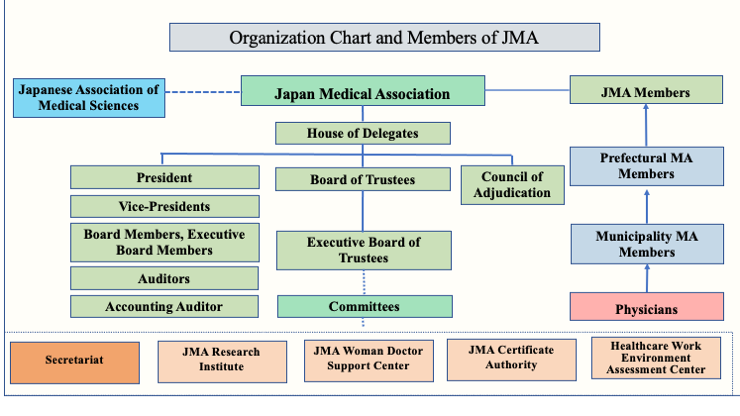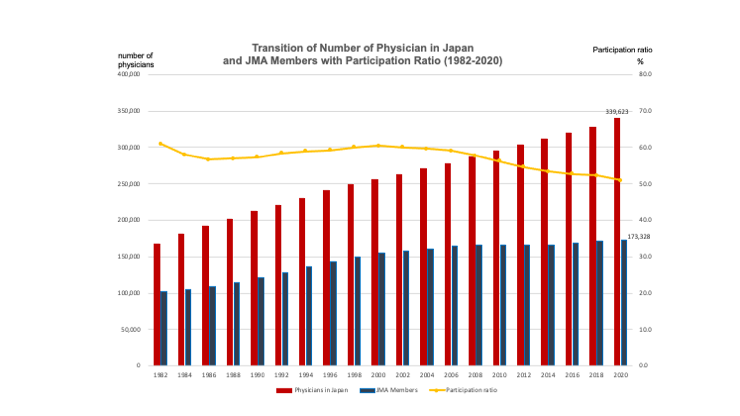About JMAOverview
Objectives & Activities
The Japan Medical Association (JMA) states its purpose in its Articles of Association as follows: "To promote the advancement of medical science, the development of medicine and the medical art, and the improvement of public health, in cooperation with prefectural medical associations and municipal medical associations, and thereby to contribute to the promotion of social welfare."
The Articles also specify 15 different projects, including matters relating to the lifelong training of physicians, the promotion and development of community health, and the improvement of insured healthcare.
The JMA is a national academic and professional organization that consists of members from 47 prefectural medical associations.
The highest decision-making body of the JMA is the House of Delegates. Delegates are elected from each Prefectural Medical Association at the rate of one delegate for every 500 members and one delegate for every fraction of that number. The regular Delegates’ Meeting is held once a year, and extraordinary Delegates' Meetings are held when necessary to deal with important matters.
Membership
At its establishment in 1947, the JMA had about 50,000 members, but as of 1 December 2022, it had grown to 173,761 members.
Prefectural Medical Associations & Municipal Medical Associations
Prefectural Medical Associations are established in administrative areas, while Municipal Medical Associations are not necessarily limited to administrative areas. Each Prefectural Medical Association is composed of members from Municipal Medical Associations. As of the end of June 2022, the number of Municipal Medical Associations is 889, including 65 University Medical Associations and 11 Prefectural Government Medical Associations. Although the Municipal Medical Associations, Prefectural Medical Associations, and the Japan Medical Association are all independent organizations, they work in close collaboration and cooperation.
The JMA has about 50 committees within the association, including the Committee on Bioethics, the Committee on Medical Policy, and the Council for the Promotion of Medical Science. Each committee consists of experts in medicine, economics, law, legislation, administration, etc., and makes recommendations from the standpoint of national healthcare. These recommendations are reflected in administrative action through the participation of many members, as a professional medical body, in policy deliberations on national and local medical, health, and welfare issues.

The Japanese Association of Medical Sciences (JAMS)
The Japanese Association of Medical Sciences (JAMS) was established in April 1902 by 16 specialist medical societies that jointly held the first General Assembly in Tokyo. The purpose of JAMS is to "contribute to the improvement of medical science and care through the research and development of science and technology in the field of medicine." It was affiliated to the Japan Medical Association during the reorganization that took place on March 8, 1948. Its current membership consists of 141 specialist medical societies.
JAMS holds its General Assembly every four years. In 2023, the 31st General Assembly was held in Tokyo under the main theme "Big data opens up the future of medical science and healthcare - in search of a prosperous 100-year life era."
